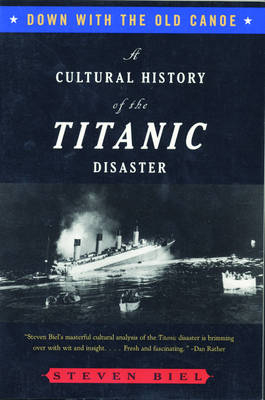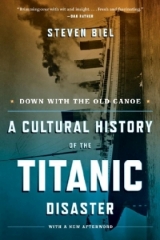
Down with the Old Canoe
A Cultural History of the Titanic Disaster
Seiten
1997
WW Norton & Co (Verlag)
978-0-393-31676-6 (ISBN)
WW Norton & Co (Verlag)
978-0-393-31676-6 (ISBN)
Zu diesem Artikel existiert eine Nachauflage
An immensely readable, provocative, and entertaining exploration of the Titanic as cultural icon.
"I suggest, henceforth, when a woman talks women's rights, she be answered with the word Titanic, nothing more—just Titanic," wrote a St. Louis man to the St. Louis Post-Dispatch. He was not alone in mining the ship for a metaphor. Everyone found ammunition in the Titanic—suffragists and their opponents; radicals, reformers, and capitalists; critics of technology and modern life; racists and xenophobes and champions of racial and ethnic equality; editorial writers and folk singers, preachers and poets.
Protestant sermons used the Titanic to condemn the budding consumer society ("We know the end of . . . the undisturbed sensualists. As they sail the sea of life we know absolutely that their ship will meet disaster."). African American toasts and working-class ballads made the ship emblematic of the foolishness of white people and the greed of the rich. A 1950s revival framed the disaster as an "older kind of disaster in which people had time to die." An ever-increasing number of Titanic buffs find heroism and order in the tale. Still in the headlines ("Titanic Baby Found Alive!" the Weekly World News declares) and a figure of everyday speech ("rearranging deck chairs . . ."), the Titanic disaster echoes within a richly diverse, paradoxical, and fascinating America.
"I suggest, henceforth, when a woman talks women's rights, she be answered with the word Titanic, nothing more—just Titanic," wrote a St. Louis man to the St. Louis Post-Dispatch. He was not alone in mining the ship for a metaphor. Everyone found ammunition in the Titanic—suffragists and their opponents; radicals, reformers, and capitalists; critics of technology and modern life; racists and xenophobes and champions of racial and ethnic equality; editorial writers and folk singers, preachers and poets.
Protestant sermons used the Titanic to condemn the budding consumer society ("We know the end of . . . the undisturbed sensualists. As they sail the sea of life we know absolutely that their ship will meet disaster."). African American toasts and working-class ballads made the ship emblematic of the foolishness of white people and the greed of the rich. A 1950s revival framed the disaster as an "older kind of disaster in which people had time to die." An ever-increasing number of Titanic buffs find heroism and order in the tale. Still in the headlines ("Titanic Baby Found Alive!" the Weekly World News declares) and a figure of everyday speech ("rearranging deck chairs . . ."), the Titanic disaster echoes within a richly diverse, paradoxical, and fascinating America.
Steven Biel is the executive director of the Mahindra Humanities Center and a senior lecturer on history and literature at Harvard University.
| Erscheint lt. Verlag | 31.12.1997 |
|---|---|
| Sprache | englisch |
| Maße | 140 x 211 mm |
| Gewicht | 398 g |
| Themenwelt | Natur / Technik ► Fahrzeuge / Flugzeuge / Schiffe ► Schiffe |
| Geisteswissenschaften ► Geschichte ► Teilgebiete der Geschichte | |
| Sozialwissenschaften | |
| ISBN-10 | 0-393-31676-9 / 0393316769 |
| ISBN-13 | 978-0-393-31676-6 / 9780393316766 |
| Zustand | Neuware |
| Haben Sie eine Frage zum Produkt? |
Mehr entdecken
aus dem Bereich
aus dem Bereich
internationales Jahrbuch der Seefahrt
Buch | Softcover (2024)
Koehler in Maximilian Verlag GmbH & Co. KG
CHF 35,90



